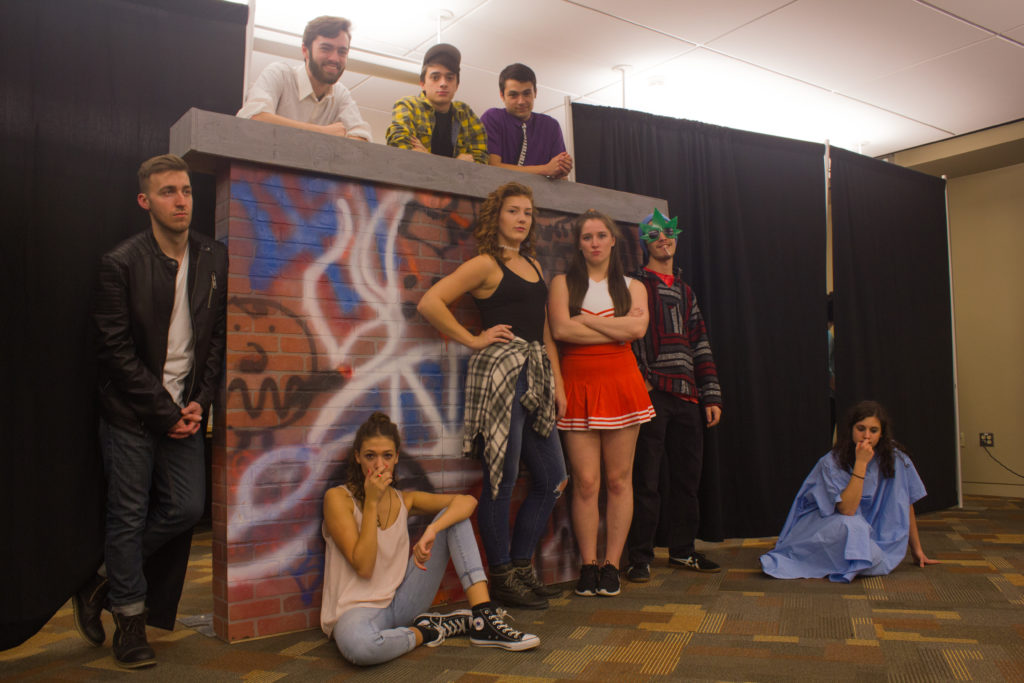
ZOE KIRIAZIS
Staff Writer
The Performing Arts Company opened the second show in its season this year with Bert V. Royal’s “Dog Sees God: Confessions of a Teenage Blockhead.”
Charles M. Schulz’s famous comics of Charlie Brown and the Peanuts Gang are revamped for the show. The characters are grown up facing hardships, battles and moments everyday teenagers might experience. Names in the show suggest who each character is through speech, appearance and mannerisms without ever explicitly stating their original names from the comics.
Schulz passed away four years before “Dog Sees God” premiered but was honored in this production by sophomore theatre arts major Jared Eichel who, throughout the show, discreetly portrayed CB’s, or Charlie Brown’s, pen-pal, CS. Eichel was found on the opposite end of the story’s action, watching the characters and stories he created grow up and adapt.
“Dog Sees God” handles a lot of heavy life situations, such as child sexual abuse, suicide, homophobia, body image, bullying, self-harm and sexuality. In her directorial debut, sophomore theatre arts major Sydney Caprio demonstrated the use of a minimal set, natural lighting and light staging.
Although this show handles mature content and topics, the comic relief naturally came through with character interactions. Caprio discussed that the situations presented in the script and on-stage happens every day around the world.
Out of all the childhood characters that could be written as grownups, Caprio believes that it is easier to see yourself growing up through the Peanuts Gang than any other childhood classic. “Taking the Peanuts characters and making them grown up … it was watching yourself grow up. Suddenly you think about how they were children … and now in high school, think about how you were in high school,” Caprio explained. Schulz based the characters in Charlie Brown on many of his friends and family when the comics first began in the 1950s.
CB, portrayed by sophomore musical theatre major Tyler Hecht, begins the play by losing his dog and asks numerous times, “What do you think happens when we die?” to his friends throughout the show. Hecht established the aura of CB with each stage of grieving as the story moves along. CB takes us on the journey of what it means to find yourself and grow up from a child to a young adult.
One of the most prevalent storylines than any other plot in “Dog Sees God” is sexual identity.
Matt, played by senior acting major Andrew Vertucci, demonstrated the truth and honesty of what homophobia looks like in America. Matt throws around homosexual slurs, bullies the character Beethoven, portrayed by sophomore musical theatre major Noah Barnes, and becomes disgusted by the thought of anything that relates to the LGBTQ+ community.
In Barnes’ interpretation of Beethoven, he and CB have a stand-off about the bullying Beethoven has experienced: avoiding the cafeteria for two years, not using the bathroom in school, physical attacks and living in fear because of his sexual identity. A chill filled the audience as Barnes delivered Beethoven’s heartache story of being sexually abused by his father who went to jail and the bullying he has continued to live through.
The situations Beethoven discussed in the show happens every single day in schools across America, and he became the voice for those who have been silenced.
The relationship between CB and Beethoven broke boundaries and added a unique element to the performance. Their relationship developed both emotionally and physically; they didn’t focus on the labels or defiance of what the other characters thought. Through Hecht and Barnes’ perception of their respected characters and Caprio’s direction, they were able to accept the good and bad moments together. They had each other no matter what people said or did.
Matt is inspired by the character Pig-Pen, the character who was always dirty in the Peanuts comics. Vertucci explained that in “Dog Sees God” the dirtiness of Matt was internalized. He described that, with all the negativity Matt brings, it is hard to find the moments where Matt is redeemable. He is the face and persona of what homophobia is defined as in society. “Hopefully one day people like Matt and characters like Matt will only [exist] in stories and not in real life,” Vertucci explained. Vertucci and Caprio said that the issues and battles these characters’ experience are more prevalent now than when the show first premiered in 2004 in New York City.
As heavy and as drama-filled as this show is, the comedy and laughs came from characters such as Buddhist pothead Van, portrayed by junior video production major Corey McCrea; best friends Tricia and Marcy, portrayed by junior musical theatre majors Anna Stewart and Maggie Austin; and progressive and imaginative CB’s sister, played by junior musical theatre major Carly Censi.
Van’s sister, played by junior musical major Michaela Tramuta, gave her advice as the beloved Lucy from the comics with one of the major themes of the show: “ Love and hate are the two closest emotions.” CB is able to see for the first time that there is a light at the end of the tunnel. CB demonstrates hope for anyone going through bullying, sexual exploration and feelings for someone that society might not approve of for not only himself, but anyone.
